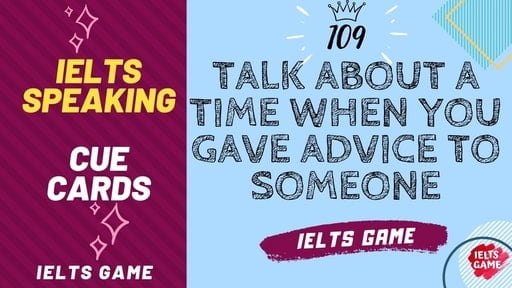110. IELTS Cue Card -
Describe a foreign culture that you are interested in
In this article, IELTS Game will add number 110 IELTS cue card sample on the series of 2020 cue cards with band 9.0 model answers and part 3 follow up questions that will help you in your IELTS test preparation.
This cue card is related to “foreign culture and tradition description” topic and asking you to “Describe a foreign culture that you are interested in.“ and asking IELTS speaking part 3 follow up questions related to cue card on Indian culture.
IELTS Cue Card Sample 110
Describe a foreign culture that you are interested in.
You should say:
- – what this culture is?
- – what you know about this culture?
- – how you learned about/from this culture?
- – and explain why you feel this culture is interesting?
Band 9.0 Sample Answer Ideas.
One foreign culture that I am interested in is Japanese culture. I have always been fascinated by Japan’s rich history, unique traditions, and beautiful landscapes.
There are a few things that I know about Japanese culture. For example, I know that Japan has a long history of art, literature, and theater, and that it is home to many beautiful temples, gardens, and castles. I also know that Japanese culture places a strong emphasis on respect, honor, and self-discipline, and that it is known for its highly developed and efficient public transportation system.
I have learned about Japanese culture in a few different ways. I have studied it in school, read books and articles about it, and watched documentaries and movies that feature Japanese culture. I have also had the opportunity to visit Japan and experience the culture firsthand, which was a very enriching and eye-opening experience.
I find Japanese culture to be interesting for a few reasons. First, I find the country’s rich history and traditions to be very fascinating and unique. Second, I appreciate the way that Japanese culture values respect, honor, and self-discipline, and I think these are important values to cultivate in one’s own life. Finally, I find Japan’s natural beauty to be very captivating, and I enjoy exploring the country’s beautiful temples, gardens, and castles. Overall, I find Japanese culture to be rich, fascinating, and deeply rewarding to learn about and experience.
Here are the difficult words from the previous answer, along with their definitions:
| Word | Definition |
|---|---|
| Unique | Very special or unusual |
| Traditions | Customs, beliefs, and habits that have been passed down from previous generations |
| Emphasis | Special importance or attention given to something |
| Self-discipline | The ability to control one’s actions and feelings, especially in order to do what one knows is right or to achieve a goal |
| Enriching | Making someone’s life better, more interesting, or more valuable |
| Eye-opening | Helping someone to see or understand something in a new way |
| Captivating | Very interesting and attractive, making it difficult to look away or stop thinking about it |
| Rewarding | Giving a feeling of satisfaction or pleasure after achieving something. |
Band 9.0 Sample Answer Ideas.
Here are some ideas about IELTS speaking about Indian culture or any other foreign culture or tradition.
• Nowadays, we belong to a small global village.
• National boundaries have almost disappeared.
• We are exposed to foreign culture more than any other time in history.
• I know of many foreign cultures such as the fast food culture and the call-centre job culture.
• But here I would like to talk about a foreign culture which I really like.
• This is the celebration of a special day which is Mother’s Day.
• My cousin came from US last year and she told me about this day.
• She told me that it falls on the second Sunday of May every year.
• She also told me that this day basically started in America but is now celebrated in many countries of the world.
• She also told me that this day is celebrated with a lot of happiness and enthusiasm in USA.
• I feel that this culture is interesting because it gives children an opportunity to thank their mothers for all the sacrifices she does in raising them.
• Normally we take our mother for granted and never think about what she does for us.
• Such days remind us the importance of mother and motherhood.
• I was surprised to see that in stationery shops here, Mother’s Day, Father’s Day and Grandparent’s Day cards are available.
• This shows that we Indians are also following the good points of foreign culture.
IELTS Speaking part 3 Follow Up Questions.
Here are some follow up questions you may be asked during part 3 IELTS Speaking exam by the IELTS examiner related to describe a foreign culture that you are interested in IELTS Cue Card.
1. Do you think it’s important to know about other cultures?
I do think it’s extremely important to learn about other cultures.
Not only can you find out interesting things, but it makes it easier to interact with those people if you ever come in contact with them.
Also, it makes it a lot easier to do business with those cultures.
It’s important to be educated about the world and not just shut yourself into your own country.
2. How can we benefit from learning about other cultures?
Several ways that people can benefit from other cultures are in business, personal relationships, and just in self-improvement.
In business, it is necessary to know a little bit about whatever culture you plan to work with.
For instance, I think in Muslim cultures, shaking hands with your left hand is considered extremely rude.
If you didn’t know that, it could hurt your chances of doing business.
Also, it’s important just to improve yourself by learning as much as you can, and culture is a good subject.
3. What do you think is the best way to learn about another culture?
Obviously, the best way to learn about a culture is to go there and experience it.
If you can get a feel for the culture firsthand, it will be a lot easier to pick things up,
But I also believe that you can learn a ton about other cultures just by reading books about them.
Reading about people’s experiences in foreign lands is the next best thing to being there.
4. Do you think that learning foreign languages can help us understand foreign cultures?
I’m not sure that just learning the language is a good way to learn about a culture, but most places where you would learn a language would help you learn about the culture, so indirectly, yes.
The language alone isn’t great for understanding culture.
For instance, German is a really harsh language, but Germans aren’t harsh people.
You really need to study more than the language if you want to get to know a culture.
5. Do you think it’s better to go overseas to study a foreign language or to study it in your home country?
I think it is better to study a language in its native country.
When you do that, you are engulfed in the language and forced to encounter it outside of the classroom.
Otherwise, your only exposure to the language is when you’re studying or in the classroom.
I know firsthand that when learning a foreign language in your home country, it is easy to lose what you have learned.
Globalization
6. What is your understanding of the term “globalization”?
Globalization, in my mind, is the idea that the world is becoming smaller, so societies can interact and exchange culture more easily and more efficiently.
Unfortunately, because some countries are richer and have more influence than others, certain cultures get spread around more than others.
On the whole, however, globalization is a good thing because it is not only culture that gets spread, but things like information and medicine that can help people.
7. Do you think globalization is a good thing?
Yes, globalization has its problems, but for the most part, it is good for most people involved.
Some people have different opinions because they are really concerned with the loss of culture, but for me, the benefits outweigh the drawbacks.
People have access to more information, so diseases can be better treated, food can be made more efficiently, and goods that make people’s lives easier are now available.
8. Do you think it’s easier to learn about other cultures today than it was before?
Yes, of course it is. All you have to do is to look at art from long ago about foreign cultures and you can see the lack of knowledge people had.
Today, with the Internet and the number of books available, it is almost impossible to be ignorant.
It is so easy to learn about anything you want.



